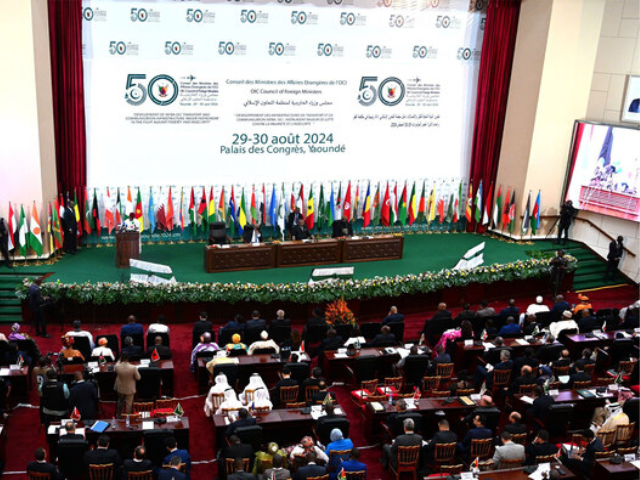Foreign Office Secretary Urges Council to Take Decisive Action Against Israeli Campaign and Its Impact on Islam’s Sacred Sites
At the recent Organization of Islamic Cooperation (OIC) Council of Foreign Ministers meeting held in Yaoundé, Cameroon, Foreign Office Secretary Muhammad Syrus Sajjad Qazi made a strong appeal for an immediate ceasefire in Gaza amid the ongoing Israeli military operations. Representing Pakistan at the two-day conference on August 29-30, Qazi condemned the intensifying violence in Gaza and the West Bank, underscoring the severe humanitarian crisis that has unfolded as a result of the conflict.
Qazi began by highlighting the devastating toll the conflict has taken on the Palestinian population. He reported that over 40,000 Palestinians have been killed, and nearly 2 million have been displaced due to the ongoing hostilities. The situation, according to Qazi, is not only a humanitarian disaster but also a grave violation of international law and human rights.
In his address, Qazi stressed the urgent need for the OIC to take decisive and coordinated action in response to the Israeli military campaign. He particularly focused on the impact of the conflict on Islam’s sacred sites, which have been endangered by the ongoing violence. The Foreign Office Secretary called on the OIC to take a firm stand against these actions, which he described as a direct assault on the religious and cultural heritage of the Muslim world.
Qazi’s call for an immediate and unconditional ceasefire was one of the key points of his speech. He urged the OIC member states to collectively demand an end to the hostilities and to work towards ensuring unrestricted humanitarian access to Gaza. He emphasized that the continued blockade and military aggression were exacerbating the suffering of the Palestinian people and that it was the responsibility of the international community, particularly the OIC, to intervene.
Furthermore, Qazi warned of the potential for the conflict to spread further across the Middle East if immediate steps are not taken to de-escalate the situation. He pointed to recent Israeli actions that have violated the sovereignty and territorial integrity of neighboring states such as Iran and Lebanon. According to Qazi, these actions risk igniting a broader regional conflict, which would have disastrous consequences not only for the Middle East but for global peace and security.

In addition to calling for a ceasefire, Qazi also stressed the need for accountability. He urged the OIC to push for international investigations into Israeli actions that have led to widespread civilian casualties and the destruction of vital infrastructure in Gaza. He argued that holding those responsible for these actions accountable is essential for achieving a just and lasting peace in the region.
Pakistan’s commitment to supporting the Palestinian cause was further demonstrated by Qazi’s mention of the country’s efforts at international forums, including the United Nations. He noted that Pakistan has consistently raised the issue of Israeli aggression and the plight of the Palestinian people in various international platforms. Moreover, he highlighted Pakistan’s humanitarian contributions, including multiple aid shipments sent to support Palestinians affected by the conflict.
Beyond the immediate crisis in Gaza, Qazi also addressed broader challenges facing the Muslim world. He expressed deep concern over the rising trend of Islamophobia globally, pointing out that Muslims are increasingly facing discrimination, attacks on mosques, and the desecration of the Holy Qur’an. Qazi called on the OIC to take a proactive role in combating Islamophobia by collaborating with international organizations such as the United Nations.
He proposed that the OIC, through its special envoy on Islamophobia, work closely with the UN to develop an action plan aimed at tackling these issues. This plan, according to Qazi, should include measures to protect Muslim communities from hate crimes, ensure the sanctity of Islamic holy sites, and promote interfaith dialogue to foster understanding and tolerance.
The OIC meeting in Yaoundé served as a critical platform for member states to discuss and address the pressing issues facing the Muslim world. Qazi’s speech, with its focus on the Palestinian crisis and the broader challenges of Islamophobia, underscored Pakistan’s commitment to advocating for the rights and dignity of Muslims globally.

